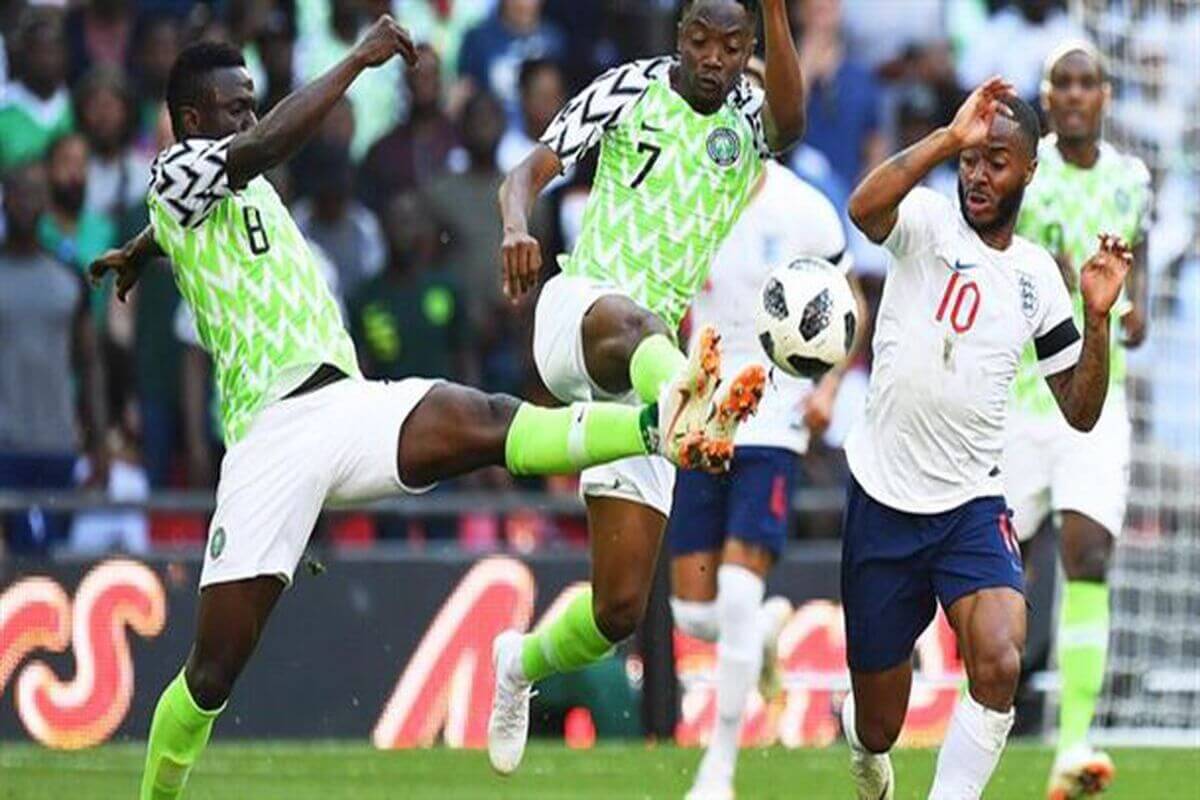Football in Nigeria dates back to the early 1900s. British colonisers brought the sport to the nation in 1904. The very first taped football match occurred that same year, starting Nigeria’s abundant footballing history.

By 1950, Football had ended up being Nigeria’s nationwide game. Its quick rise caused lots of clubs and associations forming in the early 1900s. This development boosted Nigerian pride and helped motivate political flexibility movements.
Nigeria’s football legacy now reaches beyond its borders. For many years, the country has actually produced world-class talent, and Nigerian youth teams have won the FIFA U-17 World Cup 5 times.
The Super Eagles, Nigeria’s national team, are a force in African Football. They typically get approved for substantial tournaments and make their mark internationally.
The British Colonial Introduction of Football to Nigeria
Football arrived in Nigeria throughout the British colonial age. It rapidly caught the hearts of locals, marking the start of a rich footballing tradition in the nation.
The First Football Match in 1904
The first football match in Nigeria took place in June 1904. It was in between Hope Waddell Training Institution and the team of HMS Thistle. The Nigerian group won 3-2, triggering an across the country enthusiasm for the sport.
Hope Waddell Training Institution vs HMS Thistle
I hope the Waddell Training Institution in Calabar played an essential role in early Nigerian Football. Their triumph over HMS Thistle’s crew showed the skill of Nigerian gamers. This match set the stage for Football’s growth in the country.
Early Football Club Formation (1906-1932)
After the 1904 match, Football’s popularity soared. From 1906 onwards, early football clubs began forming, and this grassroots motion spread out the sport throughout Nigeria.
The Lagos District Amateur Football Association (LDAFA) was developed in 1932. The LDAFA marked the start of organised Football in Nigeria and paved the way for the sport’s future success nationally and globally.
Who Introduced Football in Nigeria
Football got here in Nigeria in the early 20th century. British colonisers brought this beloved sport to the West African country. It rapidly became an enthusiasm that formed Nigeria’s sporting landscape for generations.
Role of British Colonisers
British colonisers played an essential function in Nigeria’s football history. The very first recorded match occurred in June 1904. Hope Waddell Training Institution dealt with the crew of HMS Thistle.
The Nigerian group won 3-2. This triumph marked the start of a rich football legacy in the country.
Formation of First Football Association
The Lagos District Amateur Football Association (LDAFA) was established in 1932. It laid the groundwork for organised Football in Nigeria, which led the way for the Nigerian Football Association (NFA).
The NFA was founded in 1945. It became the national governing body for Football and oversaw its development of football in nigeria across the nation.
Advancement of Local Football Culture
Football quickly settled in Nigeria, ending up being the national sport by 1946. Its accessibility and basic guidelines assisted it spread out rapidly. Regional neighborhoods embraced the video game, forming their teams.
This grassroots interest laid the foundation for Nigeria’s future success. The nation’s passion for Football grew, leading to accomplishments on the global phase.
“Football became more than simply a sport; it developed into an important Nigerian culture and identity element.”
The British colonisers’ introduction of Football triggered a sporting transformation in Nigeria. Football’s journey mirrored the nation’s growth from the first match in 1904 to the formation of the NFA in 1945.
Today, Football stays an integral part of Nigerian life. It’s a testament to the sport’s enduring appeal and cultural significance in the nation.
The Rise of Nigerian Football Administration
The Nigerian Football Association (NFA) was developed in 1945. It played a crucial function in shaping Nigerian Football. In 1949, the NFA formed Nigeria’s first national football group.
In 1959, Nigeria joined the Confederation of African Football (CAF), which permitted it to participate in continental competitions. Nigeria also became a FIFA member in 1960, joining the international football neighborhood.
The NFA, later on renamed the nigeria professional football league Football Federation (NFF), organised national competitions. They produced the Nigerian Premier League and the Federation Cup, which became the highlights of domestic Football.
Football associations across Nigeria flourished under the NFF’s assistance. They supported talent and promoted grassroots advancement. Expert Football began in 1990 with sixteen club sides getting involved.
“Our mission is to revive football development at the national level and repackage the league in line with worldwide best practices,” specifies the Nigeria National League.
The Premier League was executed in 2003. This relocation intended to enhance domestic football standards and draw in more spectators and sponsors to national competitions.
Nnamdi Azikiwe’s Impact on Nigerian Football
Nnamdi Azikiwe, born in 1904 in Zungeru, Northern Nigeria, left an enduring mark on Nigerian Football. His impact shaped the country’s sporting landscape. Azikiwe’s enthusiasm for sports came from his diverse experiences and education abroad.
Facility of Zik’s Athletic Club
In 1938, Azikiwe established Zik’s Athletic Club (ZAC) in Lagos. This club became a symbol of African self-determination. ZAC played an important function in developing Nigerian Football.
It provided a platform for young professional football league athletes to showcase their skills. The club promoted local talent and fostered a sense of national pride.
The West African Pilot’s Influence
Azikiwe’s paper, the West African Pilot, played a substantial function in popularising Football throughout Nigeria. It thoroughly covered regional matches, group news, and gamer profiles. This media attention helped grow the sport’s fan base.
Football as a Tool for Independence
Azikiwe saw Football’s possible as a unifying force in the self-reliance motion. He utilized the sport to break down ethnic barriers, and Football became a symbol of Nigerian unity through his advocacy.
Azikiwe’s efforts linked Football to nationalism, contributing considerably to the sport’s development and shaping its function in modern Nigeria.
“Football is not just a game; it’s an effective national unity and identity tool.”
Nigeria’s Journey to International Football Recognition
Nigeria’s football journey took a significant leap forward in 1960. The nation got FIFA subscription, marking its entry into global Football. This turning point coincided with Nigeria’s independence from British rule.
FIFA Membership and First International Match
Nigeria’s first international match took place on 8 October 1949. They dealt with Sierra Leone and won 2-0 in a historic encounter. This success sparked enthusiasm for Football across the nation.
Early Continental Competitions
Nigeria debuted in the Africa Cup of Nations in 1963. The tournament, hosted by Ghana, saw Nigeria dealing with tough challengers. These experiences proved important for the team’s development.
Nigeria’s perseverance settled in 1973. They clinched gold at the All-Africa Games, marking their very first football association major continental success. 1976, they protected bronze at the Africa Cup of Nations in Ethiopia.
Nigeria’s football prowess grew in the 1970s. In 1978, they duplicated their bronze medal accomplishment in Ghana. 1980, Nigeria hosted and won its first Africa Cup of Nations title.
Advancement of Nigerian Football Governance
Nigerian football governance has actually seen substantial modifications and challenges since 1945. The Nigeria Football Federation has shaped the country’s football landscape, and its journey has been complicated and transformative.
From NFA to NFF
The Nigeria Football Association started in 1945. It became the Nigeria Football Federation in 2008. This change aimed to modernise the organisation’s structure.
In 2019, an expense was passed to recognise the NFF officially. It’s still awaiting presidential approval.
Development of League Systems
The NFF oversees three primary leagues: the Nigerian Premier League, Amateur League, and Women’s League. These competitors form the foundation of Nigerian Football.
They foster skill and promote the sport across the country. However, obstacles like postponed seasons and location conflicts persist.
National Team Formation
Nigeria’s Super Eagles national team was formed in 1949. They’ve qualified for six FIFA World Cups and won 3 Africa Cup of Nations titles.
These achievements have increased Nigeria’s standing in international Football. The Super Eagles’ success has put Nigeria on the international football map.
However, Nigerian Football faces continuous difficulties. A research study revealed high levels of corruption in football governance. This affects agreement awards and gamer choice.
These concerns highlight the requirement for reform. For the sport to flourish, transparency in the Nigerian football administration must improve.
Conclusion
Nigerian Football’s legacy showcases the nation’s resilience and enthusiasm. It started in 1904 with Hope Waddell Training Institute dealing with HMS Thistle. Ever since, Nigeria has actually ended up being a powerhouse in African Football.
The sport’s development shows the country’s journey from colonial guideline to self-reliance. It has promoted a sense of national identity and unity. Nigeria’s international football recognition is undeniable.
The Super Eagles’ gold medal at the 1996 Atlanta Olympics is a highlight. Their impressive FIFA World Cup efficiencies likewise stand out. Nigeria has received six World Cups.
In 1994, Nigeria attained its highest FIFA ranking of 5th, solidifying its put on the global phase. Nigerian Football continues to evolve with appealing potential customers.
Skills like Ahmed Musa and Kelechi Iheanacho shine in leading European leagues. This bodes well for the sport’s development. The Nigeria Football Federation guides the video game’s development.
Football’s enduring legacy in Nigeria inspires upcoming generations and assures an interesting future for the sport. The stunning video game stays a source of national pride and unity.
FREQUENTLY ASKED QUESTION
Who presented football to Nigeria?
British colonisers brought Football to Nigeria in the early 1900s. The sport quickly ended up being popular and woven into nigerian youths culture.
When was the first football match played in Nigeria?
The very first documented football match in Nigeria took place in June 1904. Hope Waddell Training Institution bet the HMS Thistle crew. The Nigerian group won 3-2.
How did Football end up being Nigeria’s national sport?
Football’s easy rules and ease of access made it popular in Nigeria. By 1950, it was the national video game, inspiring pride and flexibility movements.
What role did Nnamdi Azikiwe play in Nigerian Football?
Nnamdi Azikiwe, Nigeria’s first President, was essential in developing Football. He began Zik’s Athletic Club in Lagos in 1938, and his newspaper, the West African Pilot, connected Football to the self-reliance movement.
When did Nigeria sign up with FIFA?
Nigeria became a FIFA member in 1960, the exact same year it got self-reliance. This significant Nigeria’s main entry into international football governance.
What is the Nigerian Football Federation?
The Nigerian Football Federation (NFF) governs Football in Nigeria. It progressed from the Nigerian Football Association, developed in 1945. The NFF arranges nationwide leagues and competitors, consisting of the Premier League and Federation Cup.
What significant successes has Nigerian Football accomplished?
Nigeria has played in 6 FIFA World Cups. The Super Eagles national team has won 3 African Cup of Nations. They’ve also won gold in the 2nd All-Africa video games.
Please login or Register to submit your answer









